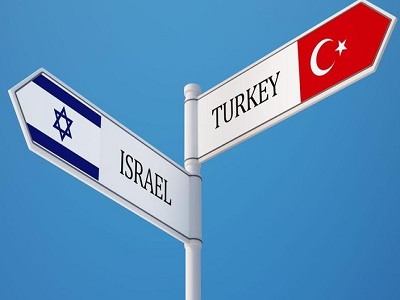
On June 26, 2016 Turkey and Israel has announced reaching a reconciliation deal that ended a six-year rift between the two countries, following an Israeli attack on the Freedom Flotilla, in May 2010, which claimed the lives of ten Turkish activists on board and stirred a wave of anger all over the world.
The killing of Turkish activists, who were trying to break the Israeli siege on Gaza, in international waters, stirred much anger in the costal enclave as well. This anger by many Palestinians was renewed on Sunday following the news of reaching a deal between the two countries.
Turkey has demanded that Israel apologize for killing Turkish activists, to pay compensation for their families, and to lift the siege of Gaza, which the organizers of the Freedom Flotilla was aiming at when they set sail. Turkish officials, including Turkish President, Recep Tayyip Erdogan, repeatedly asked for these demands to be met for any reconciliation deal to be held.
Turkey-Israel deal leaves Gaza under "hermetic, medieval siege that amounts to incremental genocide." @haidareid https://t.co/QqccAJGjzp
— Philip Weiss (@PhilWeiss) June 28, 2016
Some Palestinians in Gaza perceived the Turkish move as working in the national interests of Turkey, yet the majority of those interviewed expressed dismay at the Turkish position, which they thought prioritized Turkish economic interests over lifting the suffocating ten-year-siege imposed on Gaza by Israel.
Palestinian journalist and mother, Ghada Albardawil, 32, said, “What happened was a cheap manipulation of the Palestinian cause to achieve Turkey’s national interests. Allowing aid in is a joke that we will not buy. Turkey’s relations with Israel are old and Gaza will not benefit from this deal.”
Engineer, Mohammed Altaweel, 23, from Al-Nusierat refugee camp shared the views of Albardawil. Altaweel noted that the deal was discouraging for the people of Gaza, especially Islamists, adding, “Turkey acted according to its people’s interests, which is more important to it than Gaza, and Erdogan has no option but to maintain the interest and stability of his country.”
What's behind the reconciliatory deal between Turkey and Israel? https://t.co/KMXx5eb4oO pic.twitter.com/BNZPRNITIH
— Al Jazeera English (@AJEnglish) June 29, 2016
Altaweel noted that this deal should be a lesson for Palestinians “who never learned that counting on other countries will not bring us any good. We did not learn from the experience of 1948 and 1967. We should be more logical and less emotional from now on.”
The economic interests of Israel and Turkey were a major contributing factor to the deal between the two countries.
Ghada Abukarsh, 22, a graduate of English literature from Alazhar University in Gaza commented, “The agreement was only for the mutual national interests of both countries, which is to improve the economy, especially after Turkey entered an economic and political crisis in recently”.
Abukarsh believes that allowing aid into Gaza will help Palestinians in lifting the siege completely. “Gaza needs a fundamental solution to changing the worsening situation after 10 years of siege.”
Gaza's Palestinians sharply divided over Israel-Turkey reconciliatory deal https://t.co/JPZQtQoJC5 pic.twitter.com/xFcwo14GsF
— Al Jazeera English (@AJEnglish) June 29, 2016
At the same time, Abukharsh believes that Turkey wanted to “please Palestinians by providing aid to improve their conditions.”
Speaking of national interests, Palestinian journalist Ahmed Abuamer, 29, added, “I am a Palestinian living under siege in Gaza, yet at the end of the day, national interests govern relations between countries. I hope that the Turkish aid package which will be delivered to Gaza, including building a power plant, will improve life in Gaza.”
Dina Al-Borno,21, a political science student at the Islamic University of Gaza believes that the Turkish-Palestinian relationships will not be impacted by this deal: “Turkey was always able to provide aid for us, and having it in the agreement was meant to satisfy the Palestinian side, namely Hamas.”
Many Palestinians are searching a national strategy that makes Palestinians less dependent on other countries, one that allows them to use their own pressure tools to achieve their national interests, as other countries do. Countries, which claim to supportive of the Palestinian people and their fight for freedom and national liberation should not shake hands with a country that has lived off the Palestinian misery and has never abided by international law, Palestinians say.
(The Palestine Chronicle)





